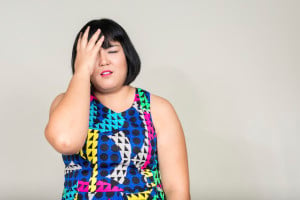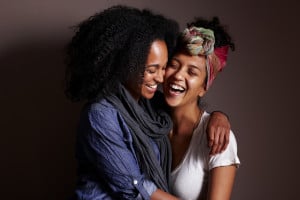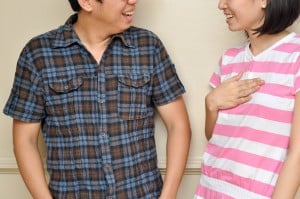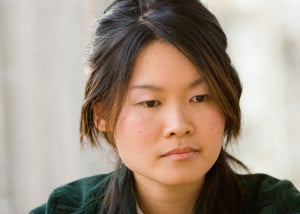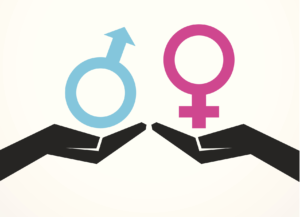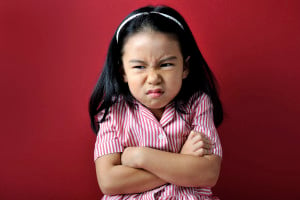(Content Warning: Disordered eating)
Originally published on xoJane and republished here with their permission.
Growing up as an Asian American, I knew I would never have the long legs or double-lidded blue eyes of the models that graced the TV screens and magazines I saw.
Hell, I might not even have the tan skin if my melanin continued to refuse to cooperate. I recognized it would be biologically impossible for me to achieve the majority of Western beauty standards, and I was okay with that.
Instead, I contented myself with believing I could do fairly well by Asian standards. My nose was upright, my hair was sleek and straight. Surrounded by petite Asian adults, I also assumed that I would grow up to be the same way. Effortlessly, easily, thin.
Then puberty arrived.
No, “arrived” is too passive of a word. Puberty blistered across my body, ravaging my hormones, skin, bones, and self-esteem all in one shot.
I put on pound after pound. I worked harder than ever at swim practice, thinking it would help keep my weight in check, but instead, my thighs thickened and my shoulders bulked up. I slowly, and painfully, realized I wasn’t blessed with the fast metabolism and birdlike bone structure I thought was a given.
I’m lucky in that my westernized parents never forced any sort of “girls should be docile and fragile” ideal on me, but that didn’t protect me from family and friends who still thought I ought to look the part. Aunts who clucked their tongues at my round thighs. Family friends who would take my mother aside and mutter in low concerned tones about how wide I was getting.
And I’m sure almost all of you can relate, it is a terrible, terrible thing to have people openly dissect the changes in your body that you feel powerless to stop.
I lived with two standards of beauty, neither of which told me any part of my body was worth loving.
I continued to struggle with my weight all throughout middle school and high school, oscillating between hating how I looked and hating how I felt about how I looked.
I knew I had body image issues, but that didn’t stop me from wanting to obtain my distorted ideals of beauty anyway. By age sixteen, I had tried fasting, juice diets, cutting out rice, calorie-counting, lettuce diets, kickboxing, and more.
Some methods, like exercise classes and eliminating soda, certainly made me healthier, but I never got my weight down to the number I wanted. Other methods, like starving myself, only added to the colossally fucked-up web of low self-esteem, perfectionism, model minority mayhem, impostor syndrome, and distorted body image that was my mind.
There was a point in this past year where I was eating about 800 calories a day. I would come home, do my homework, guzzle a giant can of green tea with a yogurt, and then go running.
I lost weight, but I was also absolutely miserable. Then I would snap, binge-eat everything I could get my hands on in the fridge, and then restart the cycle. I ate when I wasn’t hungry, then restricted myself when I was.
Food stopped being nourishment to me. It wasn’t even a reward or punishment, but a lens through which I viewed every aspect of my life.
I hit rock bottom sometime in March. I had skipped lunch that day in favor of studying for my biology and English tests. By the time I got home after speech practice, I was absolutely ravenous. One moment of indulgence led to another, and by the end of it I had eaten four bowls of pesto pasta, two red bean cakes, and an entire pint of mango ice cream.
I ended up rubbing the back of my throat bloody that night, trying to make myself throw up with the back of a tooth brush. When nothing would come up, I curled up on the bathroom floor and cried for two hours.
I told no one. Not my mom, not my boyfriend, not my closest friends. I don’t know what I felt more ashamed of at the time – the incredibly dangerous methods I was trying to lose weight with, or the fact that they weren’t working. Maybe it was both.
Slenderness is part of the beauty standard for most cultures. But part of the reason the pressure to be thin in East Asian culture is so suffocating is because it’s assumed to be a natural given.
Terms like “Asian-metabolism” and “Asian skinny genes” point toward the expectation that being slender comes effortlessly (and biologically) for people of Chinese, Taiwan, Japanese, Korean descent.
To some extent, there probably is a higher percentage of East Asian women who are naturally thin. But the usage of this potential correlation as a blanket standard for all Asians led me to believe that my inability to be effortlessly thin meant that something was wrong with me.
I was defective, and any measures I took to try and disguise this fact had to be kept secret. Beyond the ritualistic self-body-shaming sharing that most teenage girls discussed, I hid my struggle.
I silently resented my little brother, who was underweight and had to drink chocolate milkshakes after dinner to bring the scale up. I saw red after I got onto the subway in Taiwan and saw a beanpole-skinny college student toting a giant bag of fried chicken. I looked away in anger when we went out to dinner and my thinner friends would order burgers and joke about pigging out while I picked at my salad.
My name is Juliana. I am a seventeen-year-old Taiwanese American. There are many people of my descent who are naturally thin, and who are absolutely beautiful that way. I am not one of them.
But I am strong, and smart, and spunky. I can do fifteen pushups in a row. I can make my dad laugh. I can rap. And one day, I’ll be able to separate my idea of beauty from my culture’s demands for thin.
Having to buy non-S sized clothing will stop ruining my day. I will eat a goddamn cupcake and not hate myself if it shows up on the scale the next morning. I will continue to be careful with my food, but it will be because I care about my health, not my weight.
All of that begins with me acknowledging what has happened. The shame, the anger, the hatred. It begins with girls like me speaking up about the ordeals we suffered in silence and the problematic cultural expectations that led to those ordeals.
So here I am, writing to the Internet about the most personal battle I’ve ever fought. That I am fighting.
I am still in the progress of working on myself, but that doesn’t mean I can’t love my body for what it is right now.
If you can relate, please just know you’re not alone.
[do_widget id=’text-101′]
Juliana Chang is a former third culture kid and current Stanford University freshman. She has big dreams of being a poet-neuroscientist, but awfully small hands. Her favorite things include the word (not the food) “taco”, her dog Momo, curly fries, and Sarah Kay poetry. Find more of her writing on Tumblr or Facebook, or email her here.

Search our 3000+ articles!
Read our articles about:
Our online racial justice training
Used by hundreds of universities, non-profits, and businesses.
Click to learn more


